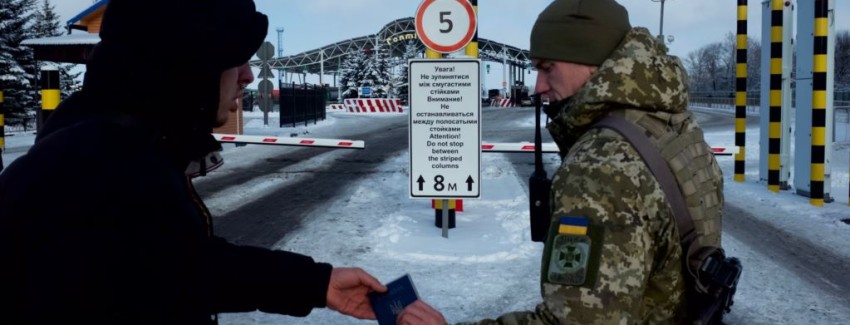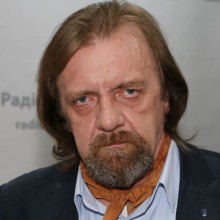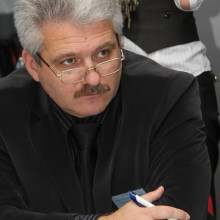Oleksandr Khara
leads the department of international multilateral relations at the "Maidan of Foreign Affairs" Foundation
Ukraine has banned entry to Russian men aged 16 to 60 – something the Ukrainian authorities should have done in 2014.
This was a necessary measure, because de facto, Ukraine is in a state of war with the Russian Federation, part of its territory has been annexed by Russia, another part is being occupied, while a creeping annexation is underway in the Azov Sea. Under such conditions, Ukraine really needed to impose such restrictions on Russians.
Besides, recall how the Crimea events unfolded in 2014, and later in Donetsk and Luhansk: Russians would massively cross into Ukraine on buses, only to later vandalize state institutions, seize weapons and further destabilize the regions, under the guise of "Ukrainian citizens."
Therefore, the latest step on part of the Ukrainian government is quite reasonable.
It should be noted that this is not about an absolute entry ban. Unfortunately, our border services so far have no clear instructions for exceptions. And, of course, there should be such exceptions. They should apply to those who have a permanent residence permit in Ukraine, first-degree family ties, etc. I think that the list should also include human rights defenders, opposition figures, and all those who are fighting Putin's regime, being our tactical allies and partners.
What's in the entry ban for the state of Ukraine? First of all, I should note that in the last years, the number of Russians visiting Ukraine has decreased significantly: in 2016-2017, some 1.5 million Russians traveled to Ukraine, while just over 2 million Ukrainians went to Russia over that period. Most traveled to Russia as tourists or visiting relatives. Also, many Ukrainians work in Russia.
By filtering Russians, we are protecting our borders from penetration by Russian intelligence operatives, potential militants, and other subversive elements.
These processes also indirectly affect Russian economy. The number of Ukrainians traveling to Russia for work has been on the fall, including due to new opportunities to work in Europe. Besides, according to Russian scientists, next year Russia will for the first time in ten years hit the "demographic pit." That is, mortality will exceed birthrate.
However, introducing restrictions on entry, Ukraine would have to take this step in tandem with other measures. For example, by severing diplomatic relations with Russia in parallel lines and also ousting Russian business from Ukraine (in particular, those oligarchs from Putin's entourage, that's not even mentioning small and medium businesses of ordinary Russians). After all, Ukraine is still seeing a dominance of Russian money and companies operating in very sensitive areas: finance, banking, communications, and energy. All this needs to be squeezed out of Ukraine, while the country should fill the void with Western investors, first of all, from countries that support Ukraine's territorial integrity not only by voting in the UN, but also by sending weapons, financial assistance, etc.
The same applies to trade. Last year, we increased imports from Russia by 40%. Over the nine months of this year – by almost 20%. Meanwhile, our exports to Russia are dropping. And the argument of our government that we keep trading with Russia to get profits that we can spend on improving defense capabilities doesn't work, because we import more from Russia than we export there. This is a negative thing.
Therefore, the reduction of trade with Russia due to reorientation to other markets is a priority issue of Ukraine's national security, as well as in terms of improvement of the economic situation in Ukraine.
In the long run, we must introduce a visa regime with Russia. This is also necessary to protect own territory and block illegal migration flows from Russia via Ukraine further to Europe. So the introduction of the visa regime would be a logical step.
Caring for Ukrainians who travel to work in Russia might be a good thing, but probably during an armed conflict, foreign aggression, occupation and annexation, there are considerations of a higher order - to preserve and save Ukraine as a state. Although I do realize that some might not like what I say. However, they will probably like even less when they find invaders in their homes, as, for example, it is happening now in Crimea where a large number of Ukrainians and Crimean Tatars cannot return to the annexed peninsula.
By the way, it is not beneficial for Russia to limit the number of Ukrainians traveling to Russia. That's because Ukrainians provide a solution to Russia's problems with labor force. This is also an element of influence on Ukraine, since family ties and staying in Russia affect the way of thinking of Ukrainians traveling there, as well as contribute to their readiness to vote for pro-Russian candidates.
Therefore, I don't think that Russia will go for any symmetrical action because restricting entry for Ukrainian men to Russia is contrary to Russia's interests. Moscow may resort to some symbolic steps and blacklist only a certain category of Ukrainian nationals. However, in view of labor force and demographic problems in Russia, Moscow is unlikely to resort to a symmetrical response.
Another point is that these restrictions also apply to the acclaimed Russians known for their pro-Ukrainian stance. What should Ukraine do about this? The country cannot afford discriminating against those who are not our enemy. Therefore, the ban should not apply to people who have obtained a permanent residence permit. Other exceptions should also be provided. Although it is impossible to foresee everything, a certain body should be set up in Ukraine, which would coordinate its work with the SBU and the Border Guard Service. Such an agency would have address such exceptions without delays.
For example, if a Russian opposition figure arrives in Ukraine asking for political asylum, how should the authorities treat them? Sending them back to Russia where something bad could happen to them? Or should they be allowed to stay in Ukraine and remain here on legal grounds? Should there be a separate list of such persons, allowing their unhindered crossing? I believe there should be a list of Russians who should be exempt from the entry ban, and there should be a mechanism for quickly addressing individual situations that will be coming up.













